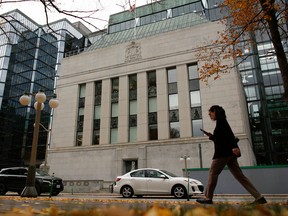Abnormally high number of immigrants granted permanent residence between 1982 and 2018 left between 2016 and 2019
Article content
There was a “record spike” in the number of immigrants who left Canada between 2016 and 2019, according to a new study that urged the government to make retaining newcomers a top priority to boost the economy.
On average, 0.9 per cent of people who were granted permanent residence in or after 1982 left Canada each year, according to the study conducted by the Institute for Canadian Citizenship (ICC) and the Conference Board of Canada.
Advertisement 2
Article content
Article content
However, in 2019, that figure went up to 1.18 per cent, which is 31 per cent higher than the average. There was also a spike in 2017, with the migration rate increasing by 43 per cent, to 1.15 per cent from 0.8 per cent in 2016. Put another way, about 67,000 people left Canada in 2019 and nearly 60,000 in 2017, the report’s researchers said at a press conference on Oct. 31.
This means that an abnormally high number of immigrants who were granted permanent residence between 1982 and 2018 preferred to leave the country between 2016 and 2019. The study also said the number of immigrants leaving the country has generally been on the rise since the 1990s.
“We are now seeing people who are coming to Canada and then saying, ‘Ah, no thanks,’ and moving on,” Daniel Bernhard, ICC’s chief executive, said. “And the number of those people are increasing. We have to believe that the lack of availability of housing, of health care, of other types of services are part of it.”
We are now seeing people who are coming to Canada and then saying, ‘Ah, no thanks,’ and moving on
Daniel Bernhard, chief executive, ICC
The study included people who were granted permanent residence between 1982 and 2018 and those who filed taxes in Canada at least once after landing.
Article content
Advertisement 3
Article content
People were counted as onward migrants — immigrants who have left the country — if they didn’t have a T1 Family File for two consecutive years and didn’t file one again by 2020, which is when the study period ends.
For example, people who become permanent residents in 2017, but didn’t have the T1 tax document in 2018 and 2019 would be considered onward migrants. The researchers used this method since the Canadian government doesn’t collect data on the number of immigrants leaving the nation, they said.
Bernhard said data for the past three years — when rising prices and the housing crisis started to dominate discussions — won’t be available for a few more years, but he expects the numbers to be “much worse” when they do arrive.
“These huge spikes (2016 to 2019) took place before anyone knew inflation was an issue, before anyone knew affordability was an issue, before housing became considered a crisis,” he said. “Immigrants were already reacting. This is what happened when Canada was sleeping.”
Immigration has traditionally played a role in boosting the economy. But with Canada battling rising prices and a housing crisis, some economists have urged the federal government to provide clear plans on how it intends to accommodate the thousands of newcomers it hopes to welcome in the next few years.
Advertisement 4
Article content

This week, the federal government will announce its annual Immigration Levels Plan, which estimates future permanent residents. Last year, Canada aimed to accept 465,000 permanent residents by 2023, 485,000 in 2024 and 500,000 in 2025.
Immigration Minister Marc Miller, who will announce his first plan since taking over the post a couple of months ago, faces an environment his predecessor rarely had to deal with. For one, Canada is going through a housing crisis, which some economists say might worsen with the country’s current targets.
In addition, Canada admitted nearly 700,000 temporary residents — foreigners who either have a work or study permit or have claimed refugee status — in the past year, a figure that’s much higher than its permanent residency targets.
But Bernhard said the narrative shouldn’t focus on how many immigrants are coming into Canada, but the number of people who are staying. If people decide to not stay and go elsewhere, the country will never be able to build the houses it needs or get the staff it requires for health care, he said.
“This is about a mind shift from thinking about immigration in terms of compassion to ambition,” he said. “It’s not good enough to just tell people that you should be happy to be here and that’s that. We need to be working harder to make sure that people are able to succeed in Canada.”
Advertisement 5
Article content
We have to do more than just attract new Canadians, but also retain them
Rebekah Young, economist, Bank of Nova Scotia
Rebekah Young, an economist at the Bank of Nova Scotia, echoed a similar sentiment and said the report is a reminder that the discussion regarding immigration shouldn’t just be about the headline numbers.
“It has been considered a longer-term risk that Canada may lose its comparative advantage in attracting talent to the country over time if it doesn’t address a host of challenges to its model,” she said. “This report shows that time might be closer than we think and underscores that we have to do more than just attract new Canadians, but also retain them.”
The study also said more immigrants are likely to leave after being here four to seven years, as such, it urged the government to invest in settlement services with a focus on an immigrant’s early years.
Related Stories
-

Canadians are questioning immigration targets
-

Focus on temporary residents in new targets
-

Canada’s population grew by more than a million last year
It also recommends the government better monitor the number of people leaving the country in order to help create better policies.
The federal government did not respond to requests for comment on the report prior to press time.
• Email: nkarim@postmedia.com
Bookmark our website and support our journalism: Don’t miss the business news you need to know — add financialpost.com to your bookmarks and sign up for our newsletters here.
Article content
‘Record spike’ in immigrants leaving Canada in recent years
2023-10-31 14:05:18








Comments
Postmedia is committed to maintaining a lively but civil forum for discussion and encourage all readers to share their views on our articles. Comments may take up to an hour for moderation before appearing on the site. We ask you to keep your comments relevant and respectful. We have enabled email notifications—you will now receive an email if you receive a reply to your comment, there is an update to a comment thread you follow or if a user you follow comments. Visit our Community Guidelines for more information and details on how to adjust your email settings.